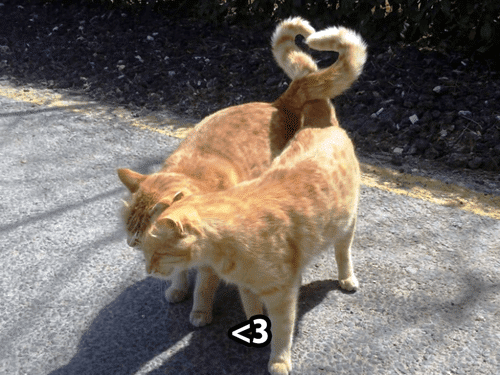
There’s probably nothing more frightening for a pet owner than hearing that little “humpf” from their veterinarian while they’re listening to their kitty’s heart. But just because your cat has a heart murmur doesn’t mean that something is seriously wrong with your cat. Heart murmurs are common in cats of all ages and something that vets encounter on a weekly, if not daily, basis.
Simply put, a heart murmur is just an out of the normal sound heard through a stethoscope. They’re the result of turbulent blood flow which can be caused by a lot of reasons including fear and stress. So that instead of producing the normal “lub-dub” sound that your kitty’s (and your own) heart normally makes, a heart murmur will have a whooshing sound that some vets refer to as being “sloushy.”
Heart murmurs in cats are graded on a scale one to six. A grade one murmur can barely be heard even with a stethoscope and can be very hard to detect. The grade six murmur is the easiest to detect and can sometimes be so loud that it obscures normal heart sounds. With severe heart murmurs, you can feel the murmur through your kitty’s chest.
Heart murmurs are very common in cats. Many are undiagnosed and maybe as many as one third of cats may have this condition. Although a murmur may signify a problem with the heart or its blood vessels, around half the cats diagnosed with a heart murmur don’t have any underlying heart disease, and many of those who do may not develop symptoms.
The turbulent blood flow that causes a murmur is usually caused by a structural defect in the heart. In younger cats, it could be a congenital condition, a defect with which they were born. In older cats, it is usually a defect that they acquired over time.
Unfortunately, sometimes kitties with heart disease show no signs of illness. That’s why it’s important to investigate a heart murmur or any signs of illness in your cat. The problem with murmurs, especially low scale ones, is that they can come and go. You vet may hear one during an exam, but not on a recheck or even a few minutes later. Murmurs are easiest to notice when a cat is stressed and their heart rate is elevated, but may be gone a few minutes later when a cat has calmed down. Some kittens may have a heart murmur when they’re first seen for testing which may disappear over time. But with older cats, it can be harder to determine just what a murmur may mean.
On its own, a heart murmur is not a reliable indicator of heart disease and can be found in sometimes even in healthy cats. If the murmur does not appear to be due to a functional problem, your kitty may not need any treatment. But depending on your cat’s age, the grade of the murmur or other symptoms, your vet may want to do some extra testing.
If your kitty has other signs of illness like as weight loss, poor appetite, vomiting, or increased thirst, your vet will likely recommend a blood profile and/or a series of x-rays and echocardiogram to help determine if your cat has a non-heart-related problem that may be causing the murmur. A predisposition for heart conditions are hereditary in some breeds like Maine Coons, British Shorthairs, Ragdolls, Rex and Persian cats, but the disease can also affect other breeds including mixed breed kitties.If you see any of these signs of illness in your kitty or if your vet detects a heart murmur, it’s always best to check it out with additional testing. Signs of heart disease in cats include:
- Vomiting
- Difficulty breathing
- Pain and inability to walk on the hind legs caused by thromboembolisms, a type of blood clots. One of the first noticeable signs of thromboembolisms in some cats is weakness or inability to walk on the hind legs.
- Depression, fainting, or weakness
- Poor appetite
- Weight loss or gain/swollen abdomen
- Restlessness
Most heart murmurs are identified during routine checkups and many healthy cats with a heart murmur never develop any problems with the heart’s function. Even kitties with a mild heart condition may never develop symptoms. Cats with mild cardiomyopathy may not need any initial treatment although in time they may need beta-blocker medications and other vitamins and supplements.
Remember a heart murmur doesn’t necessarily mean that your furry friend is doomed. And even if they are determined to have an underlying heart condition, there are still plenty of things your vet can do to help your kitty live as healthy and long a life as possible. So if you do hear this diagnosis, don’t stress. Get the facts, investigate, and help your vet make sure that your kitty has the best care possible.




